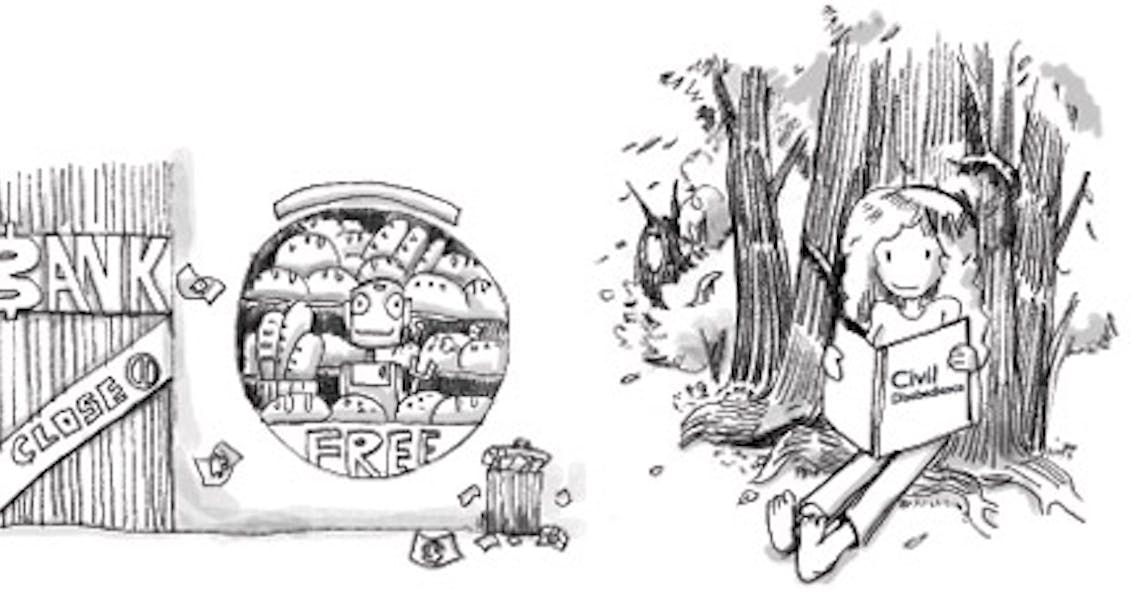
If the world doesn’t end December 21st 2012 we will have to get on with our lives. Some interpretations of the Mayan calendar have said ‘the end’ means not destruction in a literal sense, but in a figurative sense, meaning we will start a ‘New Age’. If that’s true, we might wonder what new age is ahead of us. The ancients could not imagine how we live now, so can we imagine the future of the world? Can we imagine a world with no money, no marriage, or no murder? Many philosophers, scientists, (conspiracy+) theorists think we are at a turning point (some say ‘tipping point’) in our civilisation right now a propos what we consume (+believe), how we consume, who consumes what.
Maybe the Mayans were right…

UTOPIA: the good news
The word utopia means a kind of perfect society. A man called Thomas More first used it – having taken the word from Greek – when he wrote about a perfect society in his 1516 book ‘Utopia’.
♦ It is a widely held belief that humans work within a set of systems which will always be outdated, then hopefully the emergent ideas create an improved form of civilisation. All societies will share similar instruments: an example being beliefs in Gods, the rise of feminism, consumerism, etc, but these will all become antiquated, or improved upon. We combine to create something better, towards an end goal (what the Ancient Greeks called Telos).
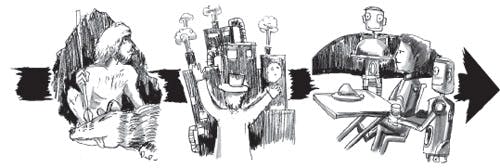
♦ Some futurists (scientists who predict the future) believe in a post-scarcity society, which means a world where we will not be fighting for natural resources and other material things. This will not be a monetary system civilisation, it will be a cashless society. Money means debt in the current fractional banking system, while debt plays a part in subjugating poor countries (rather than the old school invade and conquer method), and so creates universal contempt and hardship. A monetary system establishes fear, not love of one another, corruption, masters and slaves (not equals) we are told. Heightened technology can produce a society where we hardly work, where we use alternative, lasting, clean energies; it can create our goods with little human labour, and produce our food, and we can amply share it all. Technicians will save the day, not politicians and bankers, or even Gods, whom we will have no use for in the future. In the meantime the general population will enjoy a more leisured life in a new, cashless, crimeless, thoughtful environment, creating better technologies, and live happier ever after. Sound good? If you want to know more about this look at The Venus Project and their thoughts on “redesigning civilisation”.
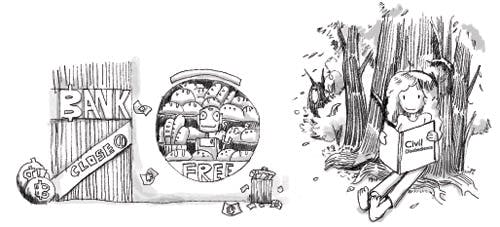
♦ A Romantic Philosopher called Georg Wilhelm Hegel believed in a happy ending for the world, where humanity will reach a point of what he called ‘Pure Spirit’, or ‘Absolute knowing’: our end point. We basically keep getting things wrong until one day we get it right. He called this the End of History. We can’t imagine this perfect world now, as at present we are stuck in this imperfect world and can only imagine things based on what we already know. He says if we can understand his book ‘Phenomenology of Spirit’ then we can enter into our Pure Spirit. Unfortunately no one understands his book.
♦ Some current philosophical romantics think we ought to get back to nature, to embrace nature, but also embrace technology. They often quote the transcendentalists Henry David Thoreau and Waldo Emerson, men whom both believed people are slaves to politics, propaganda, debt, and need to escape repressive political systems and enlighten themselves (transcend). We are all part of nature, ONE, atoms that were once stars, and so maybe we could accept this and be kinder to one another and the earth itself. Buddha was a kind of ancient transcendentalist. British poet William Wordsworth in his book The Prelude talked about a “marriage with nature” which was arguably a precursor to the ‘Green Movement’. Our modern salvation depends on us not just thinking outside of the box, but living outside of it for a while, too.
♦ A modern outcome of Hegel was the American cultural theorist Francis Fukuyama, who claimed the age of Liberal Humanist Capitalism heralded the end of the “historical plot”, meaning he thought that our present democratic capitalist system was the final system. Many people now think he was wrong.
♦ Karl Marx also read Hegel and believed he could apply his economic theory to creating the ‘perfect system’; a few people still think he was right.
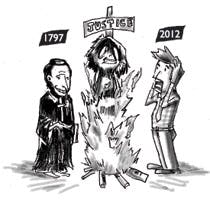
But there are many problems concerning UTOPIAS:
♦ Some scientists don’t believe in perfection at all, but they believe in things like paradigm shifts, so even though we may not create a perfect world, we will keep coming up with different solutions to problems and continually improve life. But the problem is sometimes we don’t know if our modernity is actually a good or bad thing. The stronger culture (hegemonic culture) will lead the future creating the world in its own image, but is that necessarily good? For instance, is social media improving our world? Should we embrace US economic ideology? Nazi ideology also believed it was improving the world.
♦ Michael Foucault said we are forever trapped in history, so what we think is good, bad, mad, fair, dumb, sexy, silly, evil, fashionable, is dictated to us by time and place. This asks you to really question what you believe, and understand you might be something similar to an automaton (robot), meaning your ideas about life are all kind of implanted by circumstance.
♦ Some people called pragmatists think there is no such thing as truth, only that we have words to explain truth, and language is an always developing human construct, not absolute truth. This form of pragmatism is called Ironism. They believe we can get over fundamentalist, damaging beliefs by accepting that we are progressive as a species. We might always be wrong, but we can at least be better.
♦ It’s also very important, say some other thinkers, to realise that when one person describes the meaning of a word such as ‘good’, ‘justice’, or ‘perfect’, it is always different from another person’s interpretation of those words. We are never on the same page. This is problematic.
SUPER Technology
♦ Technological Utopians think that technology will make life better for us.
♦ Eugenics, which means trying to improve humans by hereditary breeding, is outlawed, though some people still believe in breeding ‘better ‘ societies. A kind of Brave New World.
♦ Genetically engineering humans will improve the world, we are told by transhumanists. We will become superhuman and use our new capabilities to improve civilisation.
♦ Exropians believe in an Exropia where people will live indefinitely in the future, have no need for personal property, be more intelligent, believe in the value of heightened technology, sustainability, and work towards a shared goal of creating even better technologies. The Extropist Manifesto can be found online.
♦ Singularitarianism is a belief that one day computers will be cleverer than humans, and this could be very good for us, as they can figure out how to solve our problems. Though some people think this is dangerous, especially Hollywood. Watch Terminator, where machine hubris doesn’t bode well for our flesh and bones.
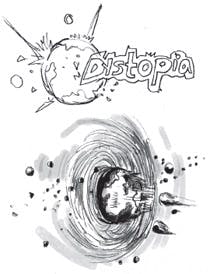
DYSTOPIA the bad news
♦ The depletion of natural resources, natural disasters, economic catastrophes, war, may persuade us to believe that our Telos might be to self-destruct. The phrase ‘we are a virus’ has become a bit of a cliché, but for good reason.
♦ All great cultures, some people say, will decline (declinism) by nature of human folly, but will the whole of humanity succumb to decline because of our greed, apathy, or stupidity? In Alexi de Touqeville’s 1835 renowned book Democracy in America he extolled much of the American “unique” democratic system, which he proposed was superior to any other political system yet created. But he had his doubts about an irreconcilable and self-interested ‘division’ between political beliefs (right and left), which he feared could create hostility and inequities. His fears, many people argue today, have become a reality. “America is great because it is good,” Touqeville once said, “but if she ceases to be good, she will cease to be great.” The American equality, freedom of expression, freedom of press, etc, that Touqeville praised is coming under fire by not only political commentators, but by people as I write this protesting in the streets. George Orwell, about 100 years later, was not so enamoured with Powerful Governments. Some critics feel that Orwell’s 1984 vision of a dystopia, replete with omnipresent surveillance (social networks), coercive news propaganda, and even room 101 style torture has become “a reality in America today”.
But these things we can mend, change, improve, some other things we cannot:
♦ We may commit omnicide (humans destroying themselves) perhaps by making a big enough bomb, or even by creating a black hole we all get sucked into.

♦ Some conspiracy theorists tell us the New World Order will create a more enslaved society, that will have to fight for the scraps it is left by the super-rich autocrats, bankers, army generals and… Secret societies made up of rich elites (the Illuminati) are aiming to rule the world we are told, while poisoning our drinking water and generally do very bad things.
♦ Evil: Evil usually accommodates history: it might be a devil, a plague, a hurricane, a witch, a flood, HIV, nuclear weaponry, Michael Jackson, and for some people now it is the illuminati. Many Christians believe in The Rapture, when at the ‘End of Times’ the goodies will be scooped up to heaven and the baddies sent to live for eternity in Pattaya… I mean Hell.
♦ Global Warming: Environmentalists tell us that if we carry on the way we do then the Himalayan glaciers will melt due to global warming by about 2350 and a large amount of the world’s population will be living in a kind of Waterworld.
♦ Or a Super Volcano could erupt and destroy much of the planet. Some scientists have said the SV at Yellowstone Park is an accident waiting to happen. While the England team might not be able to play in an away match, many of us will choke on dust, and a nuclear winter will ensue when the ash clouds block out the sun’s rays. It will be a very depressing time. Like living in Wolverhampton.
♦ Peak oil theory leads to a breakdown of agriculture and we all starve. The elites remain underground with a thousand years worth of champagne and foie gras.
♦ A super bacteria is a possible threat, if not a red heron that makes investors lots of money. Our immune systems are gradually weakened by overuse of antibiotics, and may be one day a less common kind of cold will wipe us out. Superbugs are in form these days making appearances in the film Contagion and loads of zombie films. A killer flu for some Christians might also be the Wrath of God, or pestilence, as can be read in the thriller: Book of Revelations.
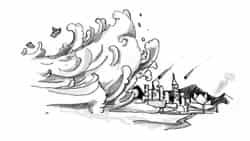
♦ Hypernova. The explosion of a very big star sends radiation flying all over the place for millions of light years. A bad scenario.
♦ A meteorite (massive impact) was too big for T-Rex, and one might kill off the human race too. Out of all the Doomsday Scenarios this is the one thought to be most realistic. It’s said that about every 10,000,000 years we get whacked by a massive piece of mineral. Imagine a small town falling on your head. Astronomers often see big meteorites in the earth’s atmosphere, but they generally stay out of our way. If they hit water, that’s when you worry about mega-tsunamis.
♦ Mega-tsunamis could produce unimaginably big waves. A lot of water to run away from. A huge rock slide or asteroid hit could possibly cause a mega-tsunami 3 kms high. Only in 1958 did a rock slide into water create waves of almost 550 metres high in Alaska. There was one male witness, and a dog.
♦ Entropy. One of my favourite words that I don’t quite understand. I think it means that everything that has energy will break down and the lost energy will turn into heat. The universe will eventually become lethargic, as perpetual motion can’t exist, and it’ll get really hot and we will all die of heat death. Much worse than heat rash. This is highly unlikely. Entropy shouldn’t stop you saving for the future.
